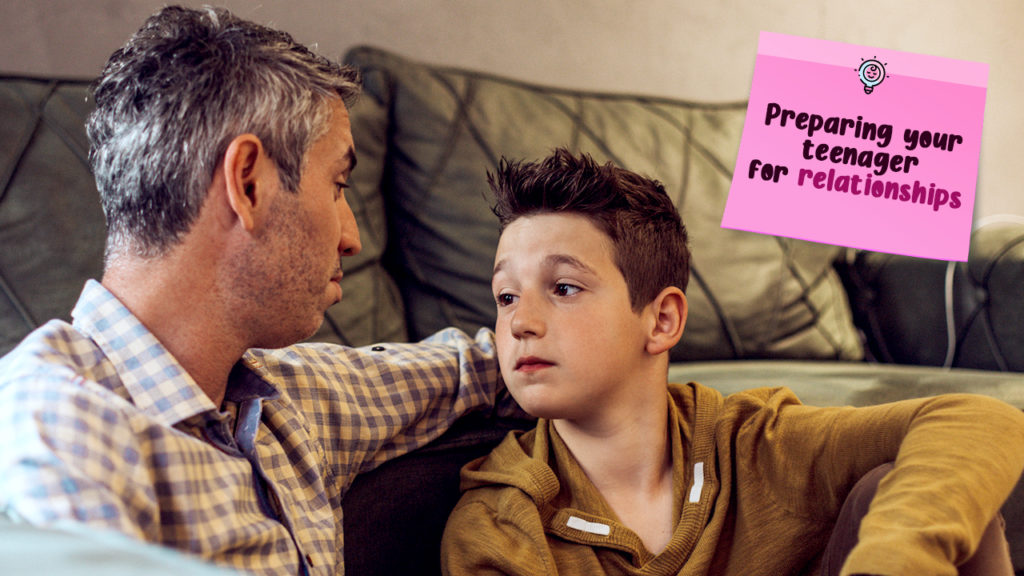You know how it feels like to be “in love.” And you know how it is to feel the joy of friendships forged in your teenager years. As your little boys and girls step on a new phase in life, it is not just their physical characteristics that change. In the final stage of childhood development, which is adolescence, your teenager will have a wider range of emotions. And before you know it, they start dating. They also start choosing which peers they want to be identified with. Feeling the need to be aware of your teenager’s relationships is normal. However, knowing your boundaries is as important. And that is why it’s time to prepare questions to ask your teenager about their relationships.

Finding the Right Questions on Teenage Relationships
Conversations about dating and teen relationship issues may start naturally when your child talks about the person they hate and like. However, that does not happen all the time. Parents of teenagers will always be curious about the lives of their children because they care. In some cases, they will wonder why their child has been acting different lately—like they start to care more about their appearance, or they seem to spend a lot of time with someone. Sometimes, mothers and fathers just want to talk about relationships during their child’s teenage years to prepare their sons and daughters for the unknown. Regardless of the reasons, here is a list of questions you may ask your teenager about their relationships:
1. How Will You Define a Relationship?
Regardless of how old or young you are, it is crucial to know what a real relationship is. By asking this question to your teenager, you will see the perspective they have regarding teenage or high school relationships. Thus, it will help you assess if they are mature enough to enter the world of dating and progress to establishing deeper relationships both platonic and otherwise. Moreover, it is also vital to know what is dating according to your child. Note that dating comes in various forms. For some people, dating means regularly communicating through social media with only little to no time together in real life. For others, it means being in an intimate relationship and going out on actual dates every now and then. While people have different perceptions of dating, you must know what version of dating your child is heading headfirst into.
After hearing your child’s views about dating and relationships, it is time for you to teach them the structure of a healthy relationship and a strong teenage friendship. Make them understand that although the presence of love is significant, that alone is not enough. Both parties should respect, support, and trust each other. The same is also true in bonds they form with people they consider as friends.

2. Are You Curious about Relationship Right Now?
Expressing their opinions regarding dating and relationships and communicating their readiness to enter into this stage of life does not necessarily mean that your children are interested in doing so right now. Remember, people can be interested but not ready, and vice versa. Therefore, directly asking them would feed your curiosity. More importantly, you will have a clearer picture of what is currently running inside your teenager’s mind. Hence, giving you an idea of whether or not they are experiencing teenage relationship problems whenever you see them looking glum.
Don’t be too afraid for them when they talk about “dating” someone. As featured in an article from Healthline, figures from the American Academy of Pediatrics revealed that, on average, girls begin to date at around 12 years old and boys at about 13 years old. Maybe, such figures will answer the question about how young is too young to date. However, you must also bear in mind that at this age, “dating” may just mean having lunch with someone close to them. So there’s really nothing to worry about as long as you give them proper guidance.
3. How Will You Describe Your “Dream Girl/Boy”?
We all have standards. And most of the time, we choose the people we want to be based on the standards we set for ourselves. Asking your kids about the qualities they are looking for in a significant other or friends is one of the most effective conversation starters. When it comes to this topic, your child tends to be excited to share about the different identities of their teenage crushes, friends, and best friends.
4. If You Have a Girlfriend/Boyfriend, How Will You Spend Time with Him/Her?
An article from MentalHelp stated that dating has four stages: the getting to know, the increasing of interest, the enlightenment, and the commitment. As the teen couple undergoes relationship development, the things that they do together also change. In most cases, they tend to be more intimate because they are now more comfortable with each other. For a more interesting conversation with your teenager, ask them how they envision date nights (or days) with their future girlfriend or boyfriend. Doing so helps them prepare themselves for what may come and gives them a definite picture of what to avoid.
5. How Will You Balance Your Time Between Friends and Your Family?

As a parent, you have to constantly remind your children that no matter how happy they are with their friends, they should never forget about their family.
That said, ask them how they will balance the time they spend with their friends and their family. Other than that, you must also remind them about the other things they need to take care of, including their studies and other social activities that they have been a part of. The key here is to divide the time they have wisely and know which ones they should prioritize.
6. Do You Know How Abusive Relationships Look Like?
Your teenager could only know so much about healthy and unhealthy relationships. That is why it is highly important for you to ask them what they know about abusive relationships. They may think that abuse only exists when their partner is hurting them physically. But sad to say, it is more than just that. Both men and women might experience abuses in the form of physical force, insults, humiliation, forced sexual activities, manipulating, bullying, and monitoring. Educating them about the different forms of abuse will protect them from it and prevent them from being abusive.
If you can, give your son or daughter a list of red flags or signs of a toxic relationship, which they have to look out for so that they can save themselves before they dive in. Moreover, make sure to explain to them when they should leave a relationship and why. Then, dealing with a controlling ex comes after. Learning when to stay is equally crucial as knowing when to leave. If you just stick to one person forever regardless of the hardships you experience because of him or her, what’s the point of being in a relationship?
7. How Do You Understand “Consent?”
When your child is in a relationship and is in their adolescence stage, they may want to experience “new” things, including being intimate. However, what will they do if they are still not ready for it? Would they be able to turn down their partner? Or would their partner agree to establish dating rules?
Hear the answers from your children themselves. And if they don’t know what to do, educate them.
As previously mentioned, one type of abuse is sexual abuse, and they should never have to experience that. For this reason, it would be beneficial if you and your child would delve more into the topic regarding consent. Tell them that they have all the rights in the world to say “no”. On the other hand, they should also learn how to take “no” as an answer. Your teenager should be well aware of the fact that being in a relationship does not automatically mean they have to do what their partner wants them to do.

Relationships develop and break. You may like the person who held your hand in the ninth grade or the one you sat together and shared your food with during lunchtime. Perhaps, it was someone you exchange text messages with after going home from school. When we were young, we saw different versions of love and friendships and your teenage children will see them too. The way we understand and nurture relationships may differ when we are older.
So when your teenager shows interest in entering into a relationship, don’t be very scared for them. It is a completely normal experience and a part of their development as a person. Instead, exhibit good parenting, render some good high school dating advice, extend your hand, and guide them along the way so that they won’t get lost.






